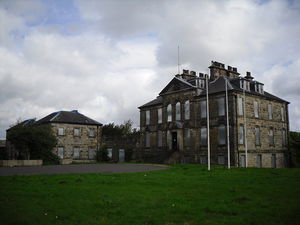Annotation:Cumbernauld House: Difference between revisions
No edit summary |
No edit summary |
||
| Line 2: | Line 2: | ||
{{TuneAnnotation | {{TuneAnnotation | ||
|f_tune_annotation_title= https://tunearch.org/wiki/Annotation:Cumbernauld_House > | |f_tune_annotation_title= https://tunearch.org/wiki/Annotation:Cumbernauld_House > | ||
|f_annotation='''CUMBERNAULD HOUSE'''. AKA – "Cumberland House," "Cumernad House." AKA and see "[[Lord Aboyne's Welcome]]." Scottish, Air (4/4 time). G Major. Standard tuning (fiddle). AABB. Cumbernauld House [http://en.wikipedia.org/wiki/Cumbernauld_House] is a fine example of neo-classical architecture designed by fashionable architect William Adam and built for the Fleming family. It was completed in 1731. The last Lord Fleming, Earl of Wigton, died childless in 1747 and the estates passed to the Elphinstone family. Charles Elphinstone-Fleming, a retired Admiral, was laird from 1799–1840, and was for a time MP for Stirlingshire. [[File:cumberlnauld.jpg|300px|thumb|left|Cumbernauld House. (photo c. Steven Spier]] | |f_annotation='''CUMBERNAULD HOUSE'''. AKA – "Cumberland House," "Cumernad House." AKA and see "[[Lord Aboyne's Welcome]]." Scottish, Air (4/4 time). G Major. Standard tuning (fiddle). AABB. Cumbernauld House [http://en.wikipedia.org/wiki/Cumbernauld_House] is a fine example of neo-classical architecture designed by fashionable architect William Adam and built for the Fleming family. It was completed in 1731. The last Lord Fleming, Earl of Wigton, died childless in 1747 and the estates passed to the Elphinstone family. Charles Elphinstone-Fleming, a retired Admiral, was laird from 1799–1840, and was for a time MP for Stirlingshire. [[File:cumberlnauld.jpg|300px|thumb|left|Cumbernauld House. (photo c. Steven Spier)]] | ||
|f_source_for_notated_version= | |f_source_for_notated_version= | ||
|f_printed_sources=Francis Barsanti ('''Collection of Old Scots Tunes'''), Edinburgh, 1742; p. 6. | |f_printed_sources=Francis Barsanti ('''Collection of Old Scots Tunes'''), Edinburgh, 1742; p. 6. | ||
Revision as of 05:15, 11 March 2024
X:1 T:Lord Aboyne’s welcome or Cumbernauld house M:C L:1/8 R:Air Q:”Slow” B:Francis Barsanti – “Collection of Old Scots Tunes” (Edinburgh, 1742, p. 6) F: https://vmirror.imslp.org/files/imglnks/usimg/b/b0/IMSLP94625-PMLP194938-Barsanti_A_Collection_of_Old_Scots_Tunes.pdf N:Francis Barsanti (1690-1775) was an Italian flautist, oboist and composer who spent N:most of his life in London and Edinburgh. Z:AK/Fiddler’s Companion K:G V:1 G>A|B>AB>d {c}B2 (AG)|E>DEG A2 B>d|e2 (d>c) d(BTAG)|(D>E)(G>A) G2:| |:TB>A|G>AB>c {Bc}d3e|Td(c/B/) AB d2 zd|e>fg>a Tf2 (g/f/e/d/)|B2 e>f Te3d| g>a (g/a/b) B2 (c/B/TA/G/)|AB {e}d(c/B/) A2 B>d|Te2 d>c d(BTAG)|(D>E)(G>A) G2:|] V:2 clef = bass z2|G,,2D,2G,2 zB,|C3G,D,2G,,2|C,>CB,>A, B,,2C2|D2D,2G,2:| z2|G,2 G,>A, B,>A,B,>C|B,2 zG, D,DB,G,|C,2 z^C, ^D,B,,E,A,|B,2B,,2 E,EDC| B,,2 zD, G,2 zG,,|C,2G,,2D,2G,,2|C,>CB,>A, B,2C2|D2D,2 G,2:|]


